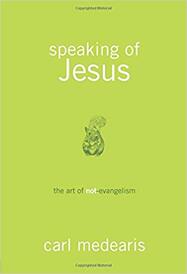 Recently, while I was searching for a new book to read on evangelism or its history, a friend recommended this book. Speaking of Jesus? I balked at the title. Do people really want to hear that name spoken? Isn’t it risky to speak of Jesus? I’ve found that even in Christian circles we often stumble over the name of Jesus or mumble it or rush past in our efforts to talk about God and what God is doing in our lives. And -- The Art of Not-Evangelism? What was that? My whole MO is to live out evangelism. What is this not-evangelism concept all about? Needless to say, as I began listening to the audiobook, I found myself in a dubious state, saying, “convince me.” Carl Medearis convinced me. What comes to mind when you hear the word Christian? In a casual survey of passersby, Carl Medearis found 50 out of 50 responses were negative. However, when he asked those 50 people what they thought of Jesus, their responses were positive. In his book Speaking of Jesus, Medearis outlines some reasons people may have, depending on their cultural background, for holding onto negative associations with Christians. For Americans, “Christian” might mean “conservative right wing Republican.” For those in the Middle East, “Christian” might mean “descendant of the crusaders or militants who kill Muslims.” For Europeans or Protestants, “Christian” might mean “some connection to the Roman Catholic Church, the Spanish Inquisition or selling the forgiveness of sins.” For those in the Far East or Africa, “Christian” might mean “Western imperialist.” I’ve talked to several Christians recently who would like to resist all labels in an effort to step away from all of that history and baggage. Some say they want to throw out the term “evangelical”. And some go as far to say they want to throw out the term “Christian”. One man I have gotten to know over the course of this year through church puts it this way: “I tell people I am someone who wants to get closer to Jesus. And I ask them, do you want to get closer to Jesus?” Medearis points out that Jesus himself was not a Christian. Jesus simply said, “follow me”, and if we can return to this simple truth in our own lives, if we can truly know the Gospel and follow him in our walk, it will open doors to speaking with more people about Jesus. Medearis claims that people don’t have to believe in God first in order to hear about Jesus. He points out that we often seek to share our faith by trying to follow a step-by-step plan to convince people more and more of our theology. He says all of that is unnecessary if we would only keep the main point the main point and speak of Jesus. “Do you know Jesus?” It’s a question, he says, to ask ourselves and to ask others. Last fall I saw this message from the Quran on a bumper sticker: What does it mean? Why would the Quran speak of Jesus? I felt a thrill rush through me when Medearis, who has worked and lived in the Middle East, pointed out that the Arabic name for Jesus is Isa and is mentioned over 80 times in the Quran as Islam’s only sinless prophet. Isa! I knew that name. A former Muslim coworker of mine had named her son Isa. I must ask her about this, I decided. Over email she readily shared her beliefs about Jesus as a prophet born of a virgin birth and that he was returning to earth someday. I have so much more to learn from her, and she encouraged me to continue my pursuit of interfaith discussions stating that we had more in common than people realize. I’m not saying I’m converting to Islam. I’m just saying that I want to know more about what people think about Jesus. He is the reason the world changed 2000 years ago, and yet, the Christianity we see around us too often focuses on theology, apologetics, politics and other causes that we miss opportunities to return to the main point. Medearis points out that for the Eastern world, Jesus is a folk hero, a man of the people “like Robin Hood.” Medearis claims that our Western focus on the cross misses an opportunity to allow him to be a man and understand his time on earth. What do you think of when you hear the name Jesus? Who is he to you? Medearis suggests there are three ways we can learn to know him. First, we know him by what we read about him through the four gospels (Matthew, Mark, Luke and John). Second, we know him by eating him -- by accepting him through communion. And third, we know him by practicing to act like him. For me, I have decided to reread the Gospels, beginning with John, in order to know the stories through and through and take the time to digest them all over again. If you have felt called to evangelism at times in your life, consider picking up Medearis’ book for a fresh perspective on what he calls “the art of not-evangelism” in order to focus your conversation on Jesus. “I am the vine; you are the branches. If a man remains in me and I in him, he will bear much fruit; apart from me you can do nothing.” (John 15:5) The book’s thesis is very simple: “Be nice, and talk about Jesus all the time.” Go, and see the fruit that God grows through you.
2 Comments
Kristin
5/1/2019 05:56:47 am
I’m super intrigued!! I like the concept...
Reply
Jenny Wang
5/2/2019 06:34:01 pm
I heard his sermon once when he visited our church, it's unforgettable.
Reply
Leave a Reply. |
Author's Log
Here you will find a catalog of my writing and reflections. Archives
December 2022
|
